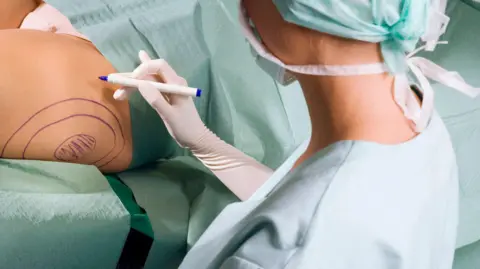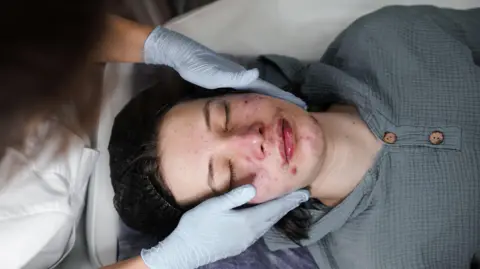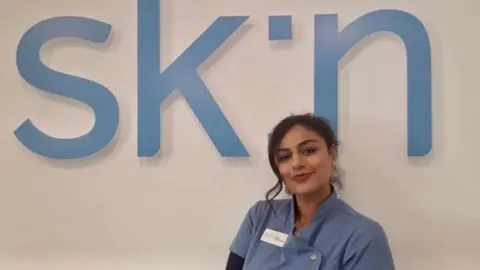By Daniel Thomas and Victoria Park-Froud, BBC News business reporters
 Getty Images
Getty ImagesThe collapse of High Street plastic surgery chain SK:N on Wednesday has shocked its customers and staff, many of whom have contacted the BBC to say they are owed thousands of pounds for treatments they’ve not yet had or wages not received.
The group, which has 70 branches across the UK under various brand names, has given little detail beyond a message on its website to say its clinics have “ceased trading” with immediate effect and that is doing “all” it can to address customer concerns.
Jane, 33, from Essex, who did not want to use her real name, says she is “so stressed” having paid £10,870 earlier this month for abdominal cosmetic surgery and liposuction.
“They took the full amount on 11 July. It was only one week ago. Surely they would have known [they were going to go bust]?” she told the BBC.
Like others, when she called her clinic she just got an automated message and has no idea if she’ll get her money back.
“I wanted the surgery because I have four children and I wanted my body to be back to how it was before I had children,” she explained.
“My Dad gave me the money for this and I was going to pay him back in small instalments. My sister had booked time off work to look after my children.”
SK:N is yet to say whether refunds will be issued but customers like Jane may struggle to get their money back, said Lisa Webb, a consumer law expert at Which?.
“Unfortunately, when a company ceases trading, customers often end up at the back of a long line of creditors, making it nearly impossible to get a refund,” she added.
However, she said there was “a light at the end of the tunnel” for people who paid for their services on credit as credit card companies were jointly liable for any breach of contract by the retailer.
“This protection is especially valuable if the retailer has gone out of business,” she added.
‘It’s shocking’
Sarah Kiely, 40, from Northampton told the BBC she had paid £1,300 for 16 treatments at a SK:N clinic but only had four of them.
However, because she used her Lloyds Bank credit card she has been told there is a chance of getting some money back.
She arrived at her local clinic yesterday to find it shut with a group of women outside trying to find out what was going on.
One of them told her she was owed £15,000 by the company.
Sarah told the BBC she felt “really sad” for the staff at the clinic who along with hundreds of others across the UK have lost their jobs overnight.
“I’ve been using this clinic for three years and have got to know the clinicians and staff. For such a huge company to give zero notice to staff or customers is shocking.”
What went wrong at SK:N?
 Getty Images
Getty ImagesSK:N group is part of the UK’s “aesthetics” sector which has grown rapidly over the last few years by filling a gap in the market for minor cosmetic treatments not covered by the NHS.
The Birmingham-headquartered firm started out in 1990 offering laser hair removal but branched out to provide services ranging from acne treatment and wart removal to lip filler and thread lifts (a type of facelift).
It’s been a challenging five years for the industry which could not operate during Covid lockdowns. It has also been hit by higher costs and slower consumer spending, due to high inflation.
A host of smaller clinics have sprung up to challenge the bigger players while health professionals such as dentists are extending their remits to include cosmetic “tweakments”, says Catherine Shuttleworth, founder of the retail consultancy Savvy.
She said that big marketing pushes by cosmetic firm overseas had also had a significant impact on UK clinics.
SK:N is not the only business to have been hit: Laser Clinics UK, a chain of 50 franchised salons, has also shut shops this year.
Did SK:N grow too fast?
Dr Aenone Harper-Machin is a spokeswoman for the British Association of Plastic, Reconstructive and Aesthetic Surgeons (Bapras) and a consultant plastic surgeon.
She says SK:N was “an excellent business concept” which filled a big gap in the market by taking aesthetics treatments “mainstream”.
But she questions whether SK:N, which was bought out by the private equity company TriSpan in 2019, had expanded too quickly.
The group had 51 clinics back then but now has over 70 nationwide under brands including SK:N Clinics, the Harley Medical Group, Skinbrands, The Skin Experts and ABC Medical.
“Laser kit is really really expensive. Their rent costs would have been too. I’m not sure but they probably overextended themselves.”
Trispan has yet to comment but the BBC understands that the owners invested heavily in trying to turn the business around but were unable to manage it.
Now, as customers chase their refunds, around 450 staff face a nervous wait to find out if they will get paid.
‘We had 15 minutes to clear out our clinics’
 Rakhee Jadav
Rakhee JadavRakhee, 31, who works at a SK:N clinic in Richmond says staff are “shocked.”
“We had 15 minutes to clear out our clinics and go home. All our clients were trying to get their money back. Some people were due to get their stitches out.
She worked for the group for nearly a decade, but says she and her colleagues were “terminated after a 10 minute video call, with no remorse, no empathy, no redundancy pay, not even a final pay slip”.
Lucie, 32, said she worked at the SK:N clinic in Guildford and had no idea the company was in trouble.
Then, like Rakhee, yesterday staff learnt the news at a Zoom meeting.
“We have been told we’re not going to get paid this month,” she told the BBC.
“We had to leave a note on the front door for our clients. They’ve all spent thousands of pounds on procedures and treatments.”
Can staff claim their wages back?
According to Citizens Advice, if your employer is insolvent you can claim some of the money your employer owes you from the Redundancy Payments Service, which is a government service.
You can claim:
- up to 8 weeks’ unpaid wages
- pay for annual leave – including annual leave you were owed but didn’t take
- statutory notice pay
- statutory redundancy pay – check if you’re entitled to statutory redundancy pay.
The maximum amount you can claim for a week’s unpaid wages or annual leave is £700 if your employment ended on or after 6 April 2024, or £643 if it ended between 6 April 2023 and 5 April 2024.
